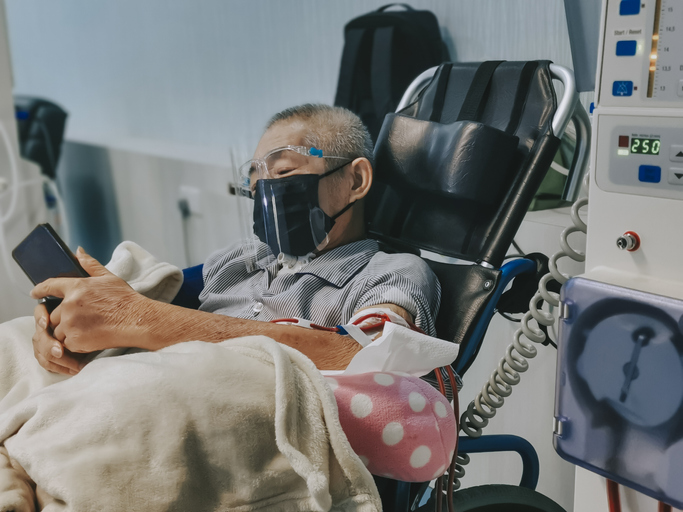
In the United States, over 550,000 people with end stage renal disease (ESRD) are dependent on dialysis care, accounting for over $36 billion a year in Medicare spending. Of those patients, 65,000 reside in skilled nursing facilities (SNF) and long-term care (LTC) facilities. As life expectancy continues to climb due to improved treatments for cardiovascular disease, cancer and other comorbidities, a steep increase in the number of frail and/or elderly patients requiring dialysis within a SNF or LTC facility is expected.
There are many pathways that lead patients to LTC facilities, requiring dialysis. In some cases, patients suffer kidney failure and functional decline after a catastrophic health event and prolonged hospitalization. Sadly, many dialysis patients deteriorate physically and cognitively, such that their care needs exceed what can be currently addressed in the home setting. The additional need for life sustaining dialysis adds increasing complexity to this mix.

Solving Healthcare’s Provider Data Problem Starts with Interoperability
Break down the silos. Take control of your provider data.
For patients living in a skilled nursing or long-term care facilities, transportation to and from a dialysis clinic three-times-a-week, often in specialized vehicles accommodating wheelchairs or stretchers, is typically required. For frail and vulnerable patients, this is an exhausting and – at times – dangerous trip. Furthermore, the cost of this specialized transport presents another undue burden to patients, as transportation to and from medical appointments – unless in the case of emergency – is not covered by Medicare.
Though innovation has been needed for ages, the Covid-19 pandemic forced dialysis providers to think of better treatment models. Transportation to and from dialysis centers, time spent waiting for treatment, and hours tethered to machines in close proximity to other patients renders social distancing virtually impossible. As a result, a persistent concern with no immediate solution is the potential risk of transporting an infected patient back to the care facility with other vulnerable patients. Illustrating the deadly impact of this challenge, to date, approximately 31% of all Covid-19-related deaths have been linked to LTC facilities in the United States.
While the Covid-19 pandemic further complicated dialysis care for patients and providers alike, it’s clear that traditional, in-center dialysis never “worked.” In fact, studies show that dialysis patient death and emergency room utilization is more apt to occur on Mondays and Tuesdays, due to a long 2-day gap in treatments over the weekend.
In particular, the first 90 days of dialysis remain a period of high cost, high admission rates and mortality. A lack of sufficient pre-dialysis and transitional care is a significant contributing factor to this reality—nearly 40% of patients with end-stage kidney disease (ESKD) initiate dialysis without adequate preparation. So, what’s the solution? A personalized approach to care that caters to patient needs, reduces risks and improves quality of life and outcomes. In many cases, this approach will include ensuring that a patient is effectively transitioned from in-center to home hemodialysis—wherever “home” may be.
Virtually all routine dialysis should be available within SNF and LTC facilities. The technology for this type of care exists and training LTC staff on easy to operate, portable dialysis devices should be the norm. Devices that can be learned to operate in under six hours and utilized by a range of healthcare employees and patients, if broadly adopted, would not only alleviate cost burden but, more importantly, protect the safety and quality of life of our frail and elderly loved ones.
Photo: Edwin Tan, Getty Images
Dr. Paul Komenda is Chief Medical Officer at Quanta, Professor of Medicine at the University of Manitoba, a fellow of the American Society of Nephrology and has extensive clinical and academic experience. Prior to joining Quanta, Dr. Komenda served on the Scientific Advisory Board of NxStage Medical.
Dr. Komenda gained his medical qualification in 2001 from the University of Manitoba and is a board-certified nephrologist. Dr. Komenda studied health economics at the University of Calgary and holds a master’s degree in health administration. Dr. Komenda has over 170 published, peer-reviewed articles in health services research and clinical nephrology and, with specialist knowledge and interest in the field of home dialysis and health economics, is highly regarded as an expert in his field.
This post appears through the MedCity Influencers program. Anyone can publish their perspective on business and innovation in healthcare on MedCity News through MedCity Influencers. Click here to find out how.








